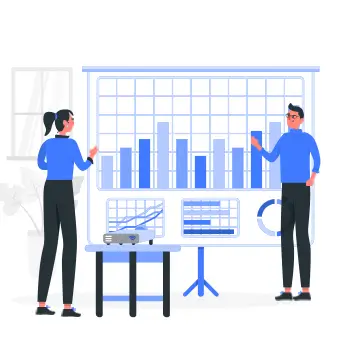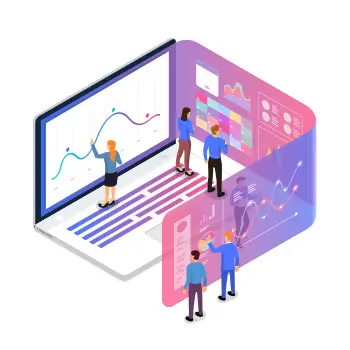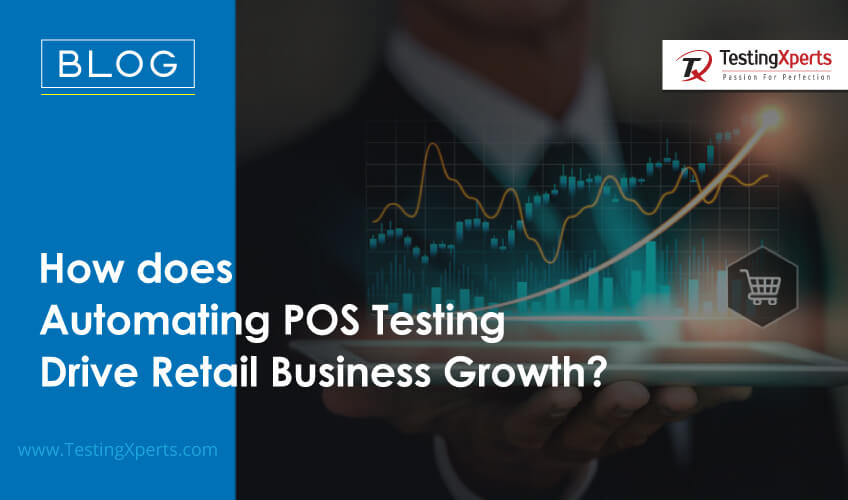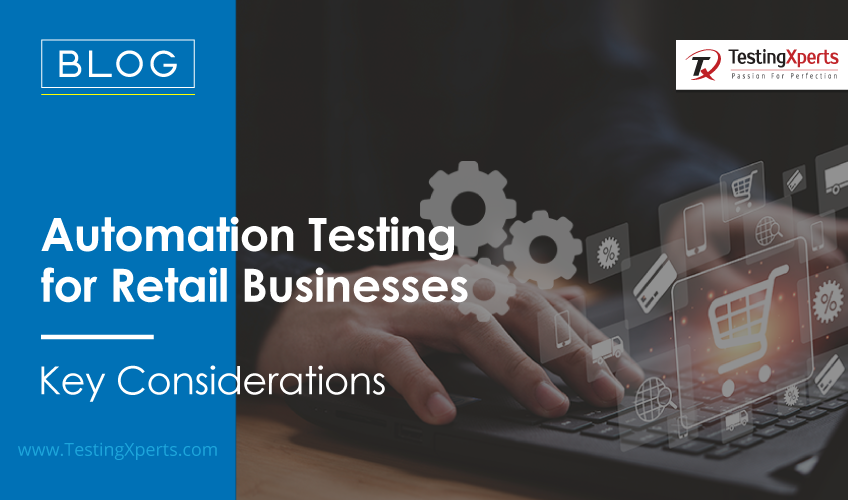
- Retail Business Intelligence Solutions
- Role of Business Intelligence Solutions in Retail
- How can BI Solutions Improve Retail Sales?
- BI Use Cases in the Retail Industry
- How does Tx Ensure Your BI Solutions Quality with Testing?
- Summary
Data is the key to informed decision-making in the retail industry. The right data can help better understand customer needs, shopping behaviour, issues, and attitudes. It is crucial in improving a retail organization’s sales success rate. Business Intelligent Solutions assists in utilizing data to its potential, leading to informed decisions and better business outcomes.
According to a survey, 58% of individuals consider BI a crucial asset for retail industry success. By integrating BI solutions with data management, analytics, and integration, businesses can gain real-time access to quality data, precisely fulfill customers’ requirements, and improve retail sales.
Retail Business Intelligence Solutions

Retail BI involves leveraging tech-based processes to collect, analyze, and interpret data from multiple sources within a retail enterprise. This helps gain actionable insights and make smarter decisions about marketing, sales performance, inventory management, product placement, pricing, and more. Businesses use advanced analytics tools to convert raw data into reports and visualizations. Further, it assists in strategic planning and forecasting, empowering retailers with enhanced CX, new growth opportunities, and optimized pricing strategies.
Leveraging raw data, retail business intelligence solutions allow retailers to gain a competitive edge and adapt to market changes. Using BI solutions, Retailers can:
- Improve customer retention rate by understanding their choices
- Optimize product planning and ensure the availability of the right products
- Plan strategic marketing campaigns to target the right audience
- Identify new sales opportunities by understanding the latest market trends
Role of Business Intelligence Solutions in Retail

According to stats
- More than 40% of revenue is generated by businesses having strong personalized marketing strategies.
- Up to 71% of consumers expect the brands to deliver personalized interactions.
- Up to 10% improvement in top-line sales is because of retail analytics.
The retail business collects trillions of bytes of data, from inventory details to customer purchases, supplier data, employee data, transaction details, and more. BI tools assist retailers in utilizing these heaps of data to deliver better customer experience. Although various retail businesses are already using BI and analytics, there are some added perks for retailers in utilizing retail BI:
- It helps track and analyze how consumers interact with eCommerce stores. This allows retailers to deliver personalized suggestions based on their shopping history, thus improving the overall buying experience.
- Businesses can leverage BI tools to access and analyze real-time data and swiftly adapt to market changes, customer buying patterns, and the latest trends. They can adjust merchandise offerings, modify prices, and create targeted marketing campaigns. This also ensures that retailers make informed decisions to remain competitive.
- By enabling BI access to operational and customer data, retailers can ensure a consistent shopping experience across multiple channels (web, mobile, and in-store).
- BI assists retailers in predicting inventory needs by foreseeing stock shortages and sending alerts to replenish inventory. Retailers can make better stocking, ordering, and merchandising decisions, thus improving efficiency and decreasing costs.
How can BI Solutions Improve Retail Sales?

The concept of leveraging business intelligence solutions in the retail sector is about enabling businesses to be smarter and agile. Following are some of the major benefits offered by BI solutions, enabling retailers to offer better consumer experience and improve their sales:
Retailing is a business of demand and supply chain management. Retailers must monitor inventory levels and ensure they meet consumer demand. BI solutions can offer them real-time data and analysis on product sales, delivery times, and stock levels. They also empower retail businesses to identify supplier problems early and adjust their supply chains, accordingly, saving them a lot of money in the long run.
Retailers can design floor plans by leveraging business intelligence software, enabling shoppers to shop without hassle. They can determine the best floor plan for each product type and floor size. BI tools use various datasets (visit durations, number of stops, etc.) and provide consumers with floor plan recommendations to help them spot products easily. This helps in improving sales and purchases.
BI software comes with dashboards that allow retailers to visualize data in graphs, tables, and charts and understand it better. It gives actionable insights that retailers can leverage to improve their operational efficiency and sales rate. Its data visualization enables retailers to monitor their sales performance by categorizing areas performing well from those requiring improvements.
Retailers can track customer data to identify the market campaigns showing positive results. By conducting data analysis, retailers can identify their best-selling products and those that should be discontinued. They can analyze data from multiple resources (surveys, website analytics, social media, etc.), see how customers interact with their products and modify their marketing campaigns accordingly.
BI solutions allow retailers to gain deep insights into consumers’ buying behavior and preferences. By analyzing consumer data, they can create personalized shopping experiences. For instance, retailers can improve their conversion rate by offering product recommendations based on past purchases. It would help improve sales rates and promote customer trust and loyalty to the brand.
BI Use Cases in the Retail Industry

Let’s look into real-world use cases involving famous brands using business intelligence applications to optimize their retail operations. These examples provide a quick overview of how BI solutions impact business outcomes:
Amazon
This eCommerce shopping giant leverages BI solutions to analyze browsing and search trends and deliver personalized recommendations to its visitors. This allows it to market its products and upcoming offers effectively. Amazon can seamlessly make accurate logistical decisions and efficiently manage its supply chain.
Starbucks
Starbucks leverages business intelligence solutions to support its loyalty card program and gain access to large data volumes. This Seattle-based coffee giant can predict what individual consumers will order next, thus offering a personalized in-store experience and increasing sales rate.
Coca-Cola
The multinational beverage company Coca-Cola utilizes BI solutions to automate manual reporting processes and save 260 hours/year. This level of report automation enables their sales team to convert CRM data into actionable insight correctly.
How does Tx Ensure Your BI Solutions Quality with Testing?

Retail business intelligence solutions can solve many challenges that retailers face every day. As a retail business owner, BI software can offer complete insights into customer data and market trends. However, it can only be made possible if you properly implement BI solutions in your business operations. To do so, you need the assistance of a QA expert who can ensure that this update doesn’t affect your current activities. The integration challenges are bound to appear, functionalities might or might not be affected, and performance issues may also appear.
Many challenges like these will appear when you plan to upgrade your operations with BI solutions. Partnering with Tx, the global software testing and QA services leader would ensure your BI systems’ integrity, performance, and accuracy. We conduct rigorous testing of your BI solutions, evaluate dashboards, and offer detailed analytics reports to guarantee the reliability and precision of the data provided. Our in-house AI-powered accelerators and in-depth testing processes can assist you in uncovering hidden insights while you make growth-driven informed decisions.
Summary
Business Intelligence (BI) solutions have become vital for retailers aiming to boost sales and enhance customer experiences. By utilizing data from various sources, BI tools provide actionable insights that help optimize marketing strategies, inventory management, and overall business operations. Retailers can use BI to predict customer behavior, identify market trends, and improve supply chain management.
Additionally, BI enables real-time data analysis, allowing businesses to make swift, informed decisions that meet consumer demands. With features like personalized shopping experiences and data visualization, BI solutions empower retailers to improve operational efficiency, enhance customer retention, and drive higher sales. Partnering with experts like Tx ensures that BI solutions are seamlessly integrated and tested for quality and performance, supporting retailers in achieving long-term success. To know more about how Tx can help, contact our experts now.
Discover more
Get in Touch
Stay Updated
Subscribe for more info




